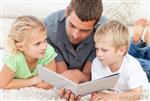- Adams School
- Tips for Parents
Reading Intervention
Page Navigation

-

As parents, you are your child's most influential teacher with an important part to play in helping your child to learn to read.
Here are some suggestions on how you can help to make this a positive experience.
1. Set a good example
Help your child see that reading is important! Set a good example for your child by reading books, newspapers, and magazines. Create a quiet, special place in your home for your child to read, write and draw. Keep books and other reading materials where your child can easily reach them.
2. Introduce new words
Discuss new words. For example, "This big house is called a palace. Who do you think lives in a palace?" Point out the printed words in your home and other places you take your child such as the grocery store. Spend as much time listening to your child as you do talking to him.
3. Make reading enjoyable
Make reading an enjoyable experience. Sit with your child. Try not to pressure if he or she is reluctant. If your child loses interest then do something else.
4. Maintain the flow
If your child mispronounces a word do not interrupt immediately. Instead, allow the opportunity for self-correction. It is better to tell a child some unknown words to maintain the flow rather than insisting on trying to build them all up from the sounds of the letters. If your child does try to 'sound out' words, encourage the use of letter sounds rather than 'alphabet names'.
5. Be positive
If your child says something nearly right to start with that is fine. Don't say 'No. That's wrong,' but 'Let's read it together' and point to the words as you say them. Boost your child's confidence with constant praise for even the smallest achievement.
6. Talk about the books
There is more to being a good reader than just being able to read the words accurately. Just as important is being able to understand what has been read. Always talk to your child about the book; about the pictures, the characters, how they think the story will end, their favorite part. You will then be able to see how well they have understood and you will help them to develop good comprehension skills.
7. Begin collecting books
Encourage your child to use the public library regularly. Help your child start a home library; paperback books are fine. Encourage your child to swap books with friends. Check used bookstores. Give books as gifts.
Use the "Rule of Thumb" to see if a book is on your children's reading level: Have them read a page of the book aloud. Have them hold up one finger for each word they don't know. If they hold up four fingers and a thumb before the end of the page, the book is probably too hard for them to read alone. But it might be a great book to read aloud.
8. Variety is important
Remember children need to experience a variety of reading materials eg. picture books, hardbacks, comics, magazines, poems, and information books.
9. Reading on the go . . .
Take books and writing materials with you whenever you leave home. This gives your child fun activities to entertain and occupy him while traveling and going to the doctor's office or other appointments.
10. Communicate with teachers
Be knowledgeable about your children's progress! Talk with your child’s teacher and other specialists at your school if you have any concerns about your child’s reading or progress.
Most importantly . . . Read with your child EVERY day!

